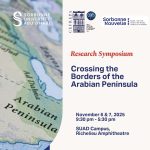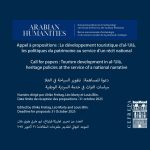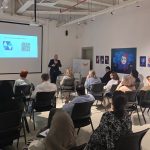COVID-19 : feedback of a PhD student
- admcef22
- January 30, 2023
Paris, 05/18/2020
I left Kuwait for fieldwork in Saudi Arabia in February, hearing the echo of a “little flu”. In the weeks that followed, the situation seemed to worsen and we chose to leave the archaeological site early. Thinking of a short-term disease, not a global pandemic, I planned to extend my stay in Saudi Arabia with a trip to al-‘Ula. At Riyadh airport, after a night’s wait for an al-‘Ula flight, on the advice of the director of CEFAS and the embassy, I had no choice but to take a flight to France before the airlines close.
The current COVID-19 crisis, far more than disrupting the daily life of research, has created an atmosphere of stress : phone calls to find out what happens to missions ; how to leave the country often for a return to France ; longing and waiting for a flight ; the academic and research world stopping or at least standing at a distance ; waiting for a date to return to the field. In spite of this somehow gloomy picture, this is also the time to take a step back from the beginning of the research for the PhD student that I am.
One cannot really say that time has stopped, indeed the life of a doctoral student is very jerky, made up of research time punctuated by months in the field and then a return to the computer and books to advance on the thesis, make reports, write articles, and so on. The most striking thing is to observe the same temporality for everyone. With lockdown and teleworking, a lot of people end up working from home, so it doesn’t really change my daily routine. Nevertheless, this is an opportunity to see how research is a somewhat quantifiable and rather solitary work. And yet, unlike jobs that do not usually involve working from home, you don’t count your hours. This is also, in my opinion, one of the strengths of the research community, which works from anywhere as long as there is access to the net. While a number of activities are struggling to implement new work tools, it seems that researchers are well equipped in this context to move forward. Although for archaeologists this is a rare circumstance where work stops, it is the time for reports and publications. This reminds us of a certain reality, namely that some areas, for one reason or another, may no longer be accessible, as has been the case in Yemen in recent years.
This also reveals an advantage of the status of a PhD student, halfway between the university and the research centers, which makes it possible to detach oneself from the organizational problems of the academic world and to continue to maintain a link with the research community by taking part in different types of seminars.
This time is also an opportunity for a sprint to do what hasn’t been done before, and to prepare for the time ahead. We are following a new credo because of the lack of access to field work and certain resources, to do everything possible with what we have. This can nevertheless lead to certain excesses with a mental overload, a willingness to do everything and sometimes to want to do too much, we will thank digitization, which despite the closure of libraries floods us with books and scientific references, which the social networks of researchers do not fail to remind us of.
Added to this is the impatient expectation of a return to collective research activity, which will certainly take place at a crazy pace, all the scientific programming risks falling into the same slot, a very condensed schedule in a desire to make up for a certain delay is to be feared.
In this context of great uncertainty, not knowing where this crisis is leading us, we cannot hide a certain concern about research funding at a time when the whole economy seems to be contracting. We cannot forget the financial situation of a great number of PhD students, and the problematic situation of friends or colleagues trying to pursue their researches in this period while living in precarious conditions.
Voir en ligne : Pour plus de billets sur le COVID-19 dans la péninsule Arabique
[1] Kuwait closed its borders to non-residents on March 11th and closed its International Airport on March 13th.





